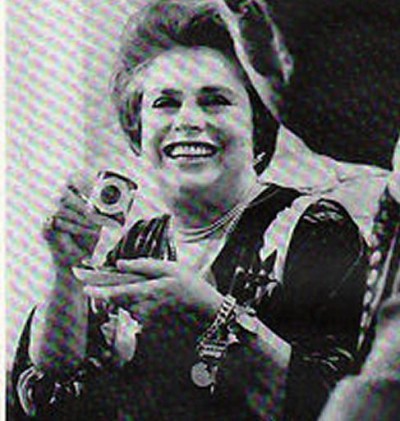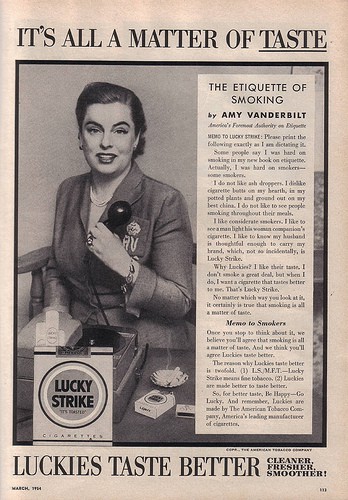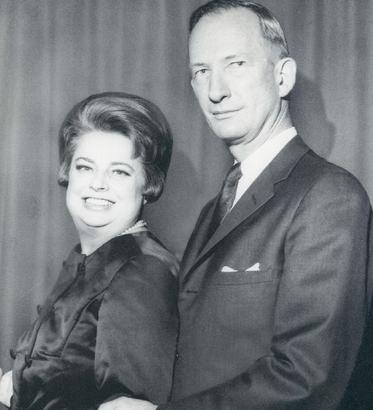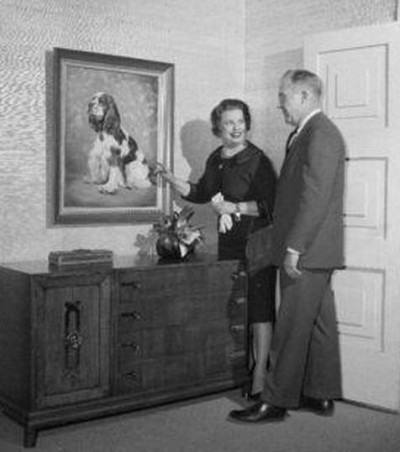The Upper Crust Must Indulge In A Return To Manners!
by Jake Tuck

In the introduction to Amy Vanderbilt’s Complete Book of Etiquette, first published in 1952, the author asks: “Who needs a book of etiquette?” Her answer: “Everyone does.” The question has not aged well. She should have inquired of the future: “Who needs this 60-year-old etiquette book?” The answer: “Society people in 2013, because they wear tennis shoes outside of the racquet club.”
Ms. Vanderbilt was too accommodating to the march of time, as the 1962 edition of her book included a section on bowling. Perhaps she should have also detailed the proper manners for youths who wish to pass drug cigarettes around the unisex bathroom whilst between frames. I’m fairly sure it goes to the left, but the procedure may vary regionally. Anyway, I don’t mean to become angered at Ms. Vanderbilt. She was fighting the good fight, but, being dead since 1974, she didn’t have opportunity to see the awful place to which the upper crust was headed. For example: who hasn’t nearly fainted upon hearing a viscount addressed by his first name? People who aren’t around viscounts often, but we’re not worried about them. The true concern is that people whose whole purpose in life is to carry the flame of tradition have forgotten to do exactly that. No, you may not rise until after the fruit course, or are we in an army mess?
The more obvious transgressions of propriety — low-hanging dungarees, tattoos on the non-Māori, lindy-hopping — are not worth addressing. We need the masses to be improper so as to better define the mannered class. Imagine if everyone had starched collars. How would we figure out, based on collar stiffness, who is meant to control the world? The situation today, of course, is the converse: everyone’s collars are limp because those who once stiffened them no longer do. (This actually occurred during Ms. Vanderbilt’s time: “A revolution has taken place… in the matter of the proper shirt to wear with a dinner jacket.”) Ideally, we would put the average blue blood in a time machine so he can relearn the notions that once set him apart.
If those of us with true manners had our druthers, we would wind the clock back to the Ancien Régime, but whatever druthers are, we don’t have them, so we can be practical and retreat to Ms. Vanderbilt’s time — “the day of the electric dishwasher, the dining ell, the deep freeze.” To be fair, in that era people were still loudly proclaiming their racism, anti-Semitism and sexism, all of which seem to have been off the mark. (At dinner, Ms. Vanderbilt wrote, a man must never “criticize another’s religion, belittle his race or country, or refer unnecessarily to his color in his presence.”) Having proper manners doesn’t mean excluding people based on race, religion or sex; it means excluding people who don’t own ascots. So we’re not advocating doing away with social progress (although I’m still not convinced women should’ve been able to become nurses in the Civil War; the men were just so bloody and dirty).
But what, a return to something so dated, you ask? Not all manners of the period are so foolish:
A man touches his hat but does not look more than briefly at a woman to whom he gives up his seat. He then stands as far away from her as possible and does not look in her direction. It is certainly not expected that a tired businessman relinquish his seat in a crowded conveyance to any woman who happens to strap-hang over him (but let his conscience be his guide). But decency dictates that he give it up to a tired mother with a young child or a baby in her arms, to a pregnant woman, or to an old or crippled one or to an old or disabled man. The relaxing of the rules has led to too many men jumping up for pretty girls who can well stand on their own two feet, while women who obviously need seats are left standing.

The problem, of course, occurs when there are two strap-hung “old” or “crippled” women, one very attractive, one less so. To whom does the decent man offer his seat? The one who doesn’t look like she might support organized labor, of course.
Now let’s get specific and see how we might distinguish ourselves in the context of a familiar scenario: you’re a man with a dinner engagement. First of all, wear at least a coat and tie. If you show up in just a blazer, you are spitting on the graves of past noblemen. “Such deshabille,” Ms. Vanderbilt wrote, may be “tolerated regionally,” but not in Eastern cities where people are special. Second, if you suffer from “the blue jowl,” do not give yourself a shaving holiday or apply any powder. You’ll either look like a caveman or a kabuki performer.
If you are a bachelor, consider yourself lucky, for as Ms. Vanderbilt wrote, you are “as rare and wondrous… as the cigar store Indian.” If you have a lady, however, things are more complicated. There is the matter of your escort’s corsage. This isn’t the senior prom, you say? Fine, but if you fail to provide your lady with flowers, don’t be surprised when she is later mistaken for a serf. Don’t go overboard, as Ms. Vanderbilt pointed out: “A man who is laying siege to a girl’s heart does well not to systematize his flower-sending.”
Once you’re outside, in public, please do not kiss your lady, unless you enjoy strangers vomiting on you. “The Victorian gentleman,” Ms. Vanderbilt wrote, “shook hands gravely with his wife and family if he met them in a public place.” She went on to approve kissing in public for us moderns (“Of course, if a man does greet a woman in public with a kiss, he must remove his hat entirely”), probably because she owed an anarchist a favor, but on this point, let’s take it back to the Victorians. People you love should be regarded as if you’re always at a funeral and you barely know them; that way, the nearby wretched consumptive straggler doesn’t feel left out, and is reminded of the death that awaits him. On conversational touching, however, Ms. Vanderbilt holds true: “Never touch a woman in a course of a conversation… except to help her up into or out of vehicles.” Ms. Vanderbilt has given you men a window for groping — take advantage of it.
At the dinner, offer your right arm to your escort and lead her into the dining room. If you are the guest of honor, you enter last, making sure to raise your chin in pride, but not so high as to seem British and/or war-disfigured. At the table, seat your lady to the right. If you can’t go right, just nod toward the chair and she will figure it out. Once service begins, make sure to be aware of the footmen and the procedure they’re following, taking your portions as they come. According to Ms. Vanderbilt, a schooled guest “never carries on a conversation with even an old family retainer.” Never assist in service in any way; do not stack plates, raise them to the footman, or spin them like you are in a circus, even if that is your actual vocation.

Second portions may be taken if offered, but if no one else is indulging, you may appear a glutton. The proper guest must take a little of everything, even if he doesn’t intend to eat it. “This is done,” Ms. Vanderbilt wrote, “so the attentive host or hostess will not imagine he has been overlooked in the presentation of dishes.” Used silver is placed on the right side of the plate, knife blade facing the inside, fork tines up. Oh, utensil placement doesn’t seem to be a big deal? Then however do you think society spots deviants? As Ms. Vanderbilt wrote: “it is very difficult to overcome slipshod table manners.” One mistake will haunt you forever, such as when my cousin Millicent fumbled the handled soup, a gaffe as infamous as Merkle’s Boner.
When the meal is over, ladies rise, leaving the men to cigars and liqueurs. “For one robustious Lothario to make off after the ladies is considered bad conduct,” Ms. Vanderbilt wrote. (Although, remember: “A woman does not refer to herself as a ‘lady’ to her social equals.”) It’s fine, you will have two more groping windows later, when getting into and out of a taxi, so stay put and conspire to bet long on beet futures — just make sure the ladies haven’t fed you false crop reports while concurrently betting short. Do not under any circumstances leave before the guest of honor, unless of course there is a more auspicious party to go to. On the way home, make sure to suspect someone of being a communist.
But perhaps, to be fair, not every minute of the clock needs turning back. For instance:
• “Nothing frightens a man more than presumption on the part of a woman. If ever a woman needs to be obtuse with the male it is when he is courting her but has not yet declared himself.”
• “The very important woman is a tempting target for a jealous male associate. She rubs him the wrong way, threatens his position, overrides his suggestions, and tramples on his pride. She forgets the feminine graces and cajoleries and tries to meet him man-to-man. This leads to inevitable defeat. If women in business would only remember that they are women in business they would meet so much less resistance from men.”
• “It’s hard to face this, but no woman can find happiness in putting career above her husband and family.”

Surely there can be a return to upper crust manners without an attendant return to cave-man-ism. After all, to resist office cajoleries from women is to resist the true American spirit. Although perhaps some things haven’t changed in half a century:
A girl living in, say, New York, after being brought up in a small town, can grow very lonely, waiting until she is asked out by the all-too-few unattached males she may meet in her office or elsewhere. A young man need not be even passably attractive to have as much social life as he wishes in such a metropolitan center. The competition for him, at least as an escort, is very keen, even if his prospects are meager and his spending money minuscule.
As rare and wondrous cosmopolitan beings, men deserve to treat themselves to a return to manners, to behave as a proper gentleman from not so many years gone by, just as so much of Brooklyn’s servant class has returned to beards and suspenders and dated hats. You’re probably thinking that behaving with such recently-retired manners is ridiculous, that people will think you’re method acting or just an incredible asshole. No. You are restoring tradition to those who must carry it on. And you are bringing grace and pleasure to all along the way:
If he is seated or standing near her in a social group, a man leans over and holds a light to a woman’s cigarette, if she has made the gesture of taking one herself. A thoughtful man, though he be a non-smoker, carries matches for this purpose or even a lighter. One very correct man-about-town I know carries both lighter and cigarette case, although he never smokes himself.
If nothing else, the modern man facilitates lung cancer. Actually, maybe don’t do that.
With this return to manners, we can set aside all of the dreary modern quarrels that make dating and dining so fraught and disastrous for today’s upper class. We might once again distinguish ourselves as apart, above, through our code of conduct: warrior monks armed with starched collars and the proper manners for ship launchings.
Jake Tuck writes screenplays and other things. He is known to be a man for all seasons.
